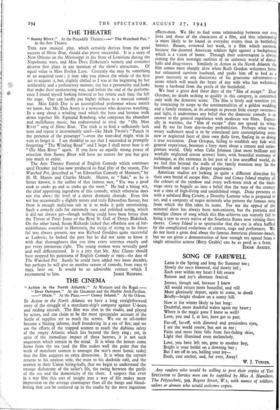THE THEATRE
Ti-us new musical play, which certainly derives from the great success of Show Boat, should also prove successful. It is a story of
New Orleans on the Mississippi in the State of Louisiana during the Napoleonic wars, and Miss Dora Zinkeisen's scenery and costumes deserve first place in any mention of the show's attractions. Of equal value is Miss Evelyn Laye. Certainly she may be something of an acquired taste ; it may take you almost ,the whole of the first act to acquire it, but, slightly chilled as I was at the beginning by her
artificiality and a perfunctory manner, she has a personality and looks that make their unshattering way, and before the end of the perform- ance I found myself looking forward to her return each time she left the stage. One can hardly pay higher tribute to a musical comedy star. Miss Edith Day is an accomplished performer whose merits we know, but Mr. Don Avory is a newcomer who deserves watching. In a song about a winding road which the hero and heroine walk down together Mr. Sigmund Romberg, who composes the abundant and mellifluous music, has endeavoured to rival the " Ole Man River " song of Show Boat. The trick is to find a sufficiently lush tune and repeat it interminably until—like Mark Twain's " Punch in the presence of the passenger "—even the tone-deaf might wish in vain to forget it. I am thankful to say that I succeeded in promptly forgetting " The Winding Road " and I hope I shall never hear it or " Ole Man River " again. If you have an equally strong power of rejection then Sunny River will have no terrors for you but give you much to enjoy. The Arts Theatre Festival of English Comedy which continues until October 3rd has now produced its final play of the season, The Watched Pot, described as " an Edwardian Comedy of Manners," by H. H. Munro and Charles Maude. Munro, or '" Saki," as he is better known, is the author of that famous mot, " She was a good cook as cooks go and as cooks go she went." He had a biting wit, the chief appetising ingredient of this comedy, which otherwise does not rise above the level of a clever dramatic charade. Even this wit has occasionally a slightly musty and truly Edwardian flavour, but there is enough malicious salt in it to make it gaily entertaining. Such a comedy calls for extremely sure and polished acting, which it did not always get—though nothing could have been better than the Trevor of Peter Jones or` the Ren6 St. Gall of Denys Blakelock. On the other hand, Susan Richards lacked that effortless sort of for- midableness essential to Hortensia, the strain of trying to be force- ful was always present, nor was Richard Goulden quite successful as Ludovic; he looked the part but he did not seem to know it with that thoroughness that can time every sentence exactly and put every intonation right. The young women were severally good and well differentiated. It is a pity that Mr. Alec Clunes should have stopped his panorama of English Comedy at 1905—the date of The Watched Pot. Surely he could have added two more decades, but perhaps he will give us another season of comedy, from raos to 1943, later on. It would be an admirable venture which I






















 Previous page
Previous page